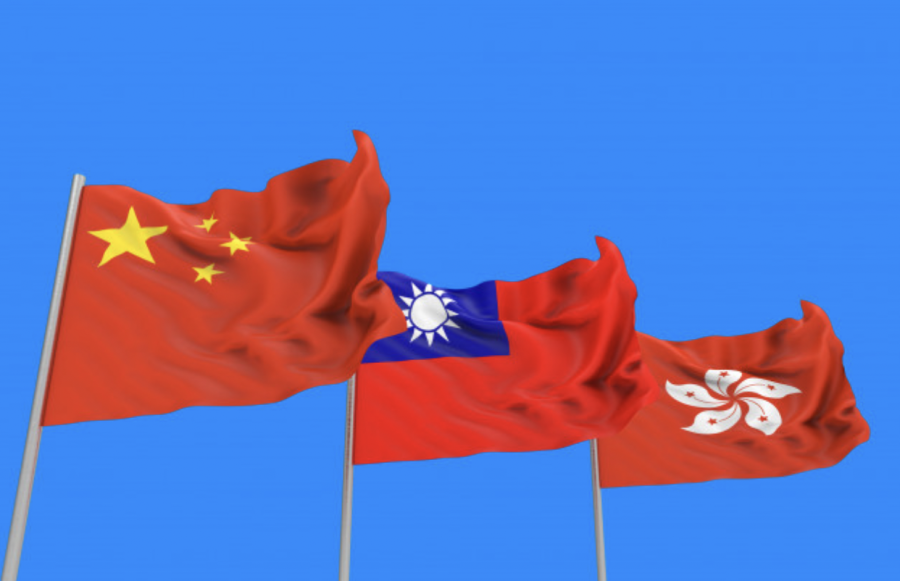Beyond Eastern Europe: New Tensions Between China and Taiwan
May 6, 2022
As the conflict between Russia and Ukraine rages on with no end in sight, the attention has turned away from one of the most militarily tense parts of the world.
Between the People’s Republic of China, and the Republic of China (commonly known as Taiwan), decade long tensions have started to swell in recent years, and particularly over the past two years.
The history between these two nations spans more than half a century. During the 1930’s into the late 40’s, mainland China was locked in a civil war between the nationalist Kuomintang party led by Chiang Kai-shek, and the Communist Party of China, led by Mao Zedong. The communists won this war in 1947, establishing the People’s Republic of China.
When the war ended and the CCP took control of mainland China, the nationalists fled to the island of Taiwan and stayed there. Since then, the CCP has controlled the mainland as the communist and authoritarian People’s Republic of China, and the nationalists have controlled Taiwan as the capitalist and democratic Republic of China.
The tensions between these two entities might be coming to a head. The PRC has been rising in global power, both economically and militarily. It has soared to have the 2nd largest GDP in the world, and is 2nd in military assets, coming second only to the US in both cases.
With this rise in Chinese power and influence, so too have their foreign ambitions. These ambitions have already found their way into Hong Kong, the former British protectorate which was handed over to the PRC with special conditions for autonomy in 1997. The PRC has been bypassing these terms and has been increasing their control over Hong Kong, to often violent protests from the people of Hong Kong.
This leads to now. With the Russian invasion of Ukraine, there has been a destabilization of international politics, and in that instability, some Chinese officials have seen room for opportunity.
Tensions between China and Taiwan have been increasing ever since former US President Donald Trump set in action policies that aimed to strengthen US support of Taiwan. In response, over the past year, the PRC has been increasing its military presence in the seas that divide the two countries.
After Russia invaded Ukraine, the US sent the Navy destroyer USS Ralph Johnson into the Taiwan strait, and sent military officials on a visit to Taipei, the capital of Taiwan. In response, China has increased its propaganda efforts regarding Taiwan, calling US support of Taiwan “futile” and denying any similarity between Ukraine and Taiwan. Later, the US approved a 95 million dollar arms package to Taiwan.
Could China hypothetically invade Taiwan?
It doesn’t seem like much of a battle. China’s military might dwarfs Taiwan’s capabilities, and their strength continues to grow. Last year, Taiwan’s defense minister warned the US that by 2025, China would be able to invade the island with minimal casualties.
The main deterrent to a Chinese invasion of Taiwan is not the island itself, but rather the countries backing Taiwan and their potential involvement. Taiwan is backed by the United States, the only military power greater than that of China. It is also backed by countries in the region such as South Korea, Japan, and Australia. While there is no NATO-like alliance bonding these countries together like in Europe, there is a shared determination to protect Taiwan’s independence. A Chinese invasion might propel the whole pacific into war.
Even if an invasion doesn’t propel China into a direct conflict with western powers, it still might cripple their economy. As has been demonstrated with Russia over the past two months, invasion of a sovereign power often comes with crippling economic sanctions directed at the aggressing country. Russia’s economy has tanked as a result of their invasion of Ukraine, and PRC officials may see a similar consequence if they invade Taiwan.
Would a Chinese invasion of Taiwan propel the US into a war with China? Possibly. The good thing though, is that a Chinese invasion of Taiwan is unlikely. Regardless, this tense region of the world will be closely monitored by the international community for years to come.







